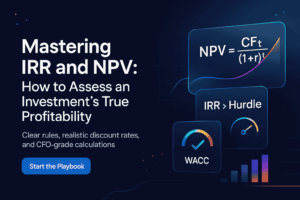Introduction
There will come a time in nearly every investor’s career that hiring a property manager makes more sense than managing the property on their own. While you can have a lot of success managing your own properties, there are circumstances when hiring a property manager might make more sense. The thing is, when you choose to hire a property manager, you are entrusting that manager with the outcome of your success and failure. Therefore, it’s imperative you take appropriate steps to protect yourself and your asset. This is one area you do not want to cut corners on.
Where to Find a Property Manager?
In today’s day in age, the internet has made finding what you are looking for ten times easier than it once was. The only thing is that there is a new hurdle that many overlook. Most people use some form of search engine to find what they are looking for. The only thing is, it’s not uncommon that most of the first page is paid advertisements. The thing about clicking on an advertisement is it can be a double-edged sword. These companies paid Google so that they pop up when someone searches for a property manager. This does help expedite what they are looking for. Unfortunately, them paying for an advertisement is not indicative of them being good at what they do.
It is still a good idea to utilize a search engine like Google to start your search but as an added resource, you can look under is the National Association of Realtors (NAR) Directories. Not every property manager is under the NAR umbrella, but it is a great way to refine your search and cut out all of the advertising fluff.
Traits to Look for Before Hiring a Property Manager
It’s nearly impossible to guarantee that someone will be a good fit for your company or property. However, it is possible to be diligent enough that the chance of having a bad manager is small. Below we have listed some key traits to look for when choosing a property manager.
An Investors Mindset
Make sure that your property manager has an in depth understanding of management from an investor’s perspective. Many property managers know how to market and find tenants, but few know how to build a business strategy to improve your bottom line. If a property manager is unable to provide you with a solid investment strategy that you can stand behind, they are more than likely not a good fit.
Stern
When it comes to property management, there will come a time that a dispute or issue will arise with a tenant. No matter what that issue may be, if your property manager isn’t stern, you will be the one who will have to deal with the repercussions of the issue. For example, if a tenant is always late on paying their rent and the property manager hasn’t put their foot down, the tenant will continue to be late with all future payments. People by nature like to test the limits and if your property manager isn’t stern your tenants will push those limits.
Patients
Although this may sound counter to #2 but, they work hand in hand. Any manager must be patient even during times they have to be stern. A successful property manager needs to know how to be patient during times of chaos. As any property owner knows, chaos is commonplace when dealing with property and people. When interviewing a potential property manager, look for someone who is willing to listen and has great customer service skills. Gauge whether they will be able to handle complaints and high stress situations gracefully.
Strong Communication Skills
There is nothing worse than going through the process of hiring a property management company only to find out they are impossible to connect with. During the initial connection with the management company, see how quickly it takes them to get back with you. Once you have them down for an interview, pay attention to how often they interrupt you while you are speaking. a management company who isn’t going to listen to you during their time of best behavior will definitely not listen to you later.
Timely
Finding a property manager that is timely is an invaluable trait. There will be countless moments timelines need to be met. If you have a manager that isn’t devoted to keeping on schedule; their laziness could cost you thousands. Make sure that you find someone who takes timelines seriously.
Creative
There is no one size fits all when it comes to managing a property. Each property is different, and every investor’s goals are different. Sometimes, it takes some ingenuity to get a property out of a pickle. Make sure that you look for someone who doesn’t have a problem thinking outside the box. Sometimes, it just takes a little creative thinking to make a big problem a little problem.
Organized
As we all know, real estate has so many moving parts. At any given time, a property manager may be required to renew a lease for one building, finding a new tenant for another, and schedule maintenance for another. This can happen in a span of one day. In order to make sure that they stay on top of all of these details, a property manager has to have excellent organizational skills. A good way to see if they have this trait is to ask them what techniques they use to stay organized. Depending on their response, this will give you insight on how they handle dealing with competing tasks at once.
Tech-Savvy
As we all know, technology has revolutionized the world. With real estate there are countless investment and management tools out there that property managers and landlords can utilize to greatly improve their overall returns. Ask them what type of tools and technology that they have at their disposal. A great product that helps both the landlords and property managers is our product Compass. Our program allows you the ability to do budgetary planning to the most accurate of detail. Make sure that you are capitalizing on the new technologies out there so that you maintain a competitive advantage over your peers.
Transparent
This is by far one of the most important traits to have in a property manager. Make sure that you find someone who is extremely transparent and will tell you the bad news as soon as it arises. This is extremely difficult to get a full handle on during an interview but a good method in testing this out is by asking them to tell you something they are embarrassed about. This may not be a work-related question on its face but how honest they are about their answer will tell a lot about how transparent of a person they are willing to be.
List your Expectations
To make things easier for you and the property management company that you are interviewing, make a list of expectations you have prior to an interview. This will help mitigate any unexpected surprises in the future because you have already outlined what is expected of each other.
As we all know, their will be companies that will not answer honestly so make sure you ask multiple questions to make sure they are consistent on their stance. In addition, it will let you know how they handle issues that typically come up.
Below is a list of only a few questions you may want to ask during each interview.
- How do you advertise and fill a rental vacancy?
- Who is accountable for advertising fees?
- What is your management fee?
- Are there any property management fees if my property is vacant?
- Do you charge an additional commission for finding a new tenant?
- Do you charge a fee if a tenant renews?
- How do you determine a fair market rental rate?
- Do you try for tenant retention or highest rent?
- Why?
- Do you provide a lease agreement, or do we have to provide our own?
- If they provide a lease agreement, make sure are thorough. It may be wise to have a legal team review it.
- What methods will you implement to improve our bottom line?
- How do you screen new tenants?
- How long, on average, does it take to fill vacancies?
- Do I have to be involved in the tenant selection process?
- How do you handle tenant maintenance requests? What about emergencies?
- How are delinquent rents handled?
- Will you handle evictions if needed?
Check Their Sources
Before you hire a property manager, make sure that you take it a step further than just asking for references. As we all know, when anyone asks for references, we typically send contacts we have good relationships with. This being the case, when it comes to you asking for references, ask for references of clients that are no longer with them and a list of their vendors. Both their reaction to this request, and what they provide, will tell a lot more about the manager than talking to the references they would typically provide.
Past Client References
When you ask for past client references, observe how they react to this question. Obviously, they will be surprised, but they will react in one of three ways.
- The first, is they will get defensive and push back on why you want past clients. If they push back and try and talk you out of receiving contacts to their past clients, it’s an easy tell that they have no good ending relationships. It is also a good tell that they can be very combative. If this is the case, it’s a safe bet to stay clear of them.
- The second outcome is they tell you that they don’t have any past clients. If they say this, they may be lying to you or they are new to the business. If you already knew that they were new to the business, you probably won’t even, ask this question to them. If they have been in the industry for some time and they say they don’t have any past clients, you might want to dive deeper into this conversation. As we know people move companies, sell property, and invest in different locations. This leads to a high probability that the property manager has at least one past client. If they cannot provide a valid reasoning as to why they cannot provide any past clients, there is a good probability they are trying to deceive you.
- The final reaction to this request is they will be more than happy to provide you those resources. Even if they do not have those contacts on hand, their willingness to provide you those references is a good tell about their character. Make sure that they follow through with this request and connect with their references.
Vendors List
The next question you should ask for after gauging their response to their past client references is, ask for a list of all of their vendors. If they made it past the past customers question, they will most likely be more than happy to provide you that list. Getting this list isn’t to gauge their response but rather to review their vendors. (Some managers may not have a vendors list. They may expect you to provide your own vendors. If this is the case, this information is not relevant.) When something breaks, your management company will contact one of those vendors on their list to come see what the problem is. Typically, this is someone they have had a long-standing relationship with. Even though they have this relationship, it doesn’t mean that they hold the same ethical standard as the management company.
Vendor Example:
This is best explained through an example. Let’s pretend the A/C unit went out and they contact an HVAC company to come see what the problem is. This company may have a good relationship with the property manager, but they just see each referral from the management company as an opportunity for a big payout when they get a call. In this scenario, they tell you and your manager that the A/C needs replaced. The manager will most likely trust the HVAC companies’ opinion and tell you that the A/C needs replaced and how much that will cost.
In reality, the A/C unit may have only needed a new relay switch that could of cost $200 to fix. Instead, you are now paying thousands of dollars to have the entire A/C unit replaced. This deception could greatly impact your ROI. The management company doesn’t care about how much you are paying in expenses because their income is based of effective gross income which is before any expenses are taken into account. This is why we recommend getting their vendors list. This will provide you the opportunity to go and check all of the vendors google reviews. That way you can see how other people’s experiences have been with these companies.
Review The Contract
Finally, make sure that you are diligent and put the time into reviewing the contract you will have between you and the property management company. It’s safe to assume that the one who wrote the contract, wrote the contract to protect themselves. That is why you need to put some time and energy into making sure you review everything. If anything doesn’t make sense or is vague ask questions. Make sure when you ask these questions, you ask through email. That way you leave a paper trail if anything arises in the future. Once you have finalized everything and you are comfortable with the contract, you can hand them the rains and watch them work.













